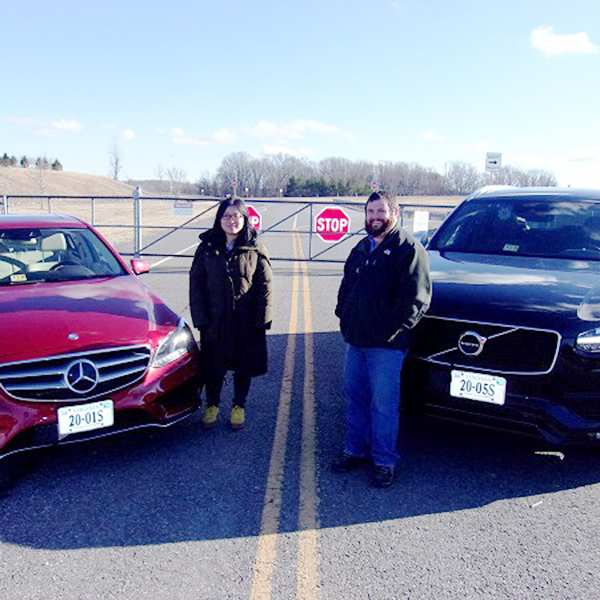
Abstract
This study is envisioned as a follow-on to a recently completed 2017 Safe-D project (Phase I). The first phase was focused on how driving exposure to automated vehicle technologies (AVT) can change how seniors, a particularly vulnerable and growing segment of our population, use and accept AVT over time. A variety of self-reported subjective data were analyzed to investigate participants’ attitudes towards AVT. Analyses revealed that seniors’ attitudes towards AVTs correlated positively with driving exposure. In addition, traditional naturalistic driving study (NDS) data were also recorded during the Phase I data collection, encompassing multi-channel video, GPS, lane tracking, and acceleration. The goal of the Phase II follow-on proposed herein is to analyze these already-collected NDS data to evaluate the safety and mobility benefits of AVT for senior drivers. Behavioral and performance comparisons will be made with that of seniors driving non-AVT vehicles, younger drivers driving the same AVT-equipped vehicles, and with trends in the subjective data collected during Phase I. It is expected that the integrated results of Phase I and II together will provide stakeholders (e.g., OEMs, governmental regulation agencies, and safety advocacy groups) with the evidence needed to document and enhance the safety and mobility benefits associated with the use of AVT by seniors. Additionally, it will also produce information that can help with their adoption and acceptance of these technologies. Regardless of the inherent safety-enhancing promise AVT holds, any technology which is neither accepted nor voluntarily used will fail to truly move the needle on public safety.
Project Highlights
- Objective: investigate whether advanced driver assistance systems (ADAS) can benefit the mobility and driving performance of older adult drivers.
- Methods: This study included a naturalistic data collection from eighteen men and women 70-79, each driving one of four ADAS-equipped vehicles for six weeks. The SHRP 2 NDS dataset served as a non-ADAS baseline of comparison, affording a similar age and location cohort.
- Results & Discussion: Mobility analyses did not yield significant differences between the two cohorts. The ADAS-equipped vehicles influenced driving performance in positive as well as negative ways. Using adaptive cruise control (ACC) may help seniors have smoother longitudinal control; however, poorer lateral control was observed during trips where ACC was used. This was the first study to investigate the influence of driving ADAS-equipped vehicles on the mobility and driving performance of older adults in real-world settings.
- This study is the first to investigate the influence of exposure to ADAS on seniors’ driving performance and mobility using objective naturalistic driving data.
- As part of the advanced feature usage analysis done as part of this study, the doctoral student on the study team developed a robust machine vision algorithm for assessing system status based on the icons visible on the instrument panel. This method holds promise for future research in the absence of OEM-provided parameter identifiers (PIDs) to decode vehicle network data.
Final Report
EWD & T2 Products
Infographic: The document was used to create a webpage to show the benefits of enabling senior drivers to adopt automated vehicle technologies may be the first step towards sustaining their mobility and road safety.
Examining Senior Drivers’ Adaptation to Mixed-Level Automated Vehicles (aka Senior Mixer or SMX): Link to the infographic website created from the document above.
ISE 3614: Introduction to Human Factors Module (ppt) and ISE 5604: Human Information Processing Module: These presentations are course modules developed from this project to introduce students to the project and the dataset.
Student Impact Statement – Dan Liang (pdf): The student(s) working on this project provided an impact statement describing what the project allowed them to learn/do/practice and how it benefited their education.
Presentations/Publications
Liang, D., Lau, N., Baker, S., and Antin, J. Examining Senior Drivers’ Attitudes Towards Advanced Driver Assistance Systems after Naturalistic Exposure. Innovation in Aging (In review, IA-2019-265)
Antin, J., (2019). Examining senior drivers’ adaptation to vehicles equipped with advanced driver assistance systems. Poster Session presented at the 8th International Symposium on Naturalistic Driving Research, August 13-14th, 2019. Melbourne, Australia.
Liang, D. Examining senior drivers’ acceptance to advanced driver assistance systems. 5th International Symposium on Future Active Safety Technology toward Zero Accidents. September 11, 2019. Blacksburg, VA.
Liang, D., Antin, J. & Lau, N. (in press). Examining senior drivers’ acceptance to advanced driver assistance systems. Proceedings of the 5th International Symposium on Future Active Safety Technology toward Zero Accidents (FAST-zero ’19).
Liang, D., Baker, S., Lau, N., and Antin, J. F. (2018). Examining senior drivers adaption to mixed level automated vehicles: Focus group results from a naturalistic driving study. Poster presentation delivered at the Automation Hub Ribbon Cutting, VTTI, Blacksburg, VA, November 2018. (Published)
Liang, D., Baker, S., Lau, N., & Antin, J. (2018). Examining senior drivers adaption to mixed level automated vehicles: focus group results from a naturalistic driving study. Poster Session presented at the 7th International Symposium on Naturalistic Driving Research, August 27-30th, 2018. Virginia Tech Transportation Institute, Blacksburg, VA, USA (Published)
“Examining Senior Drivers’ Attitudes Towards Advanced Driver Assistance Systems After Naturalistic Exposure” in journal Innovation in Aging. Liang, D., Lau, N., Baker, S. A., & Antin, J. F. (2020). Examining Senior Drivers’ Attitudes Toward Advanced Driver Assistance Systems After Naturalistic Exposure. Innovation in Aging, 4(3), igaa017.”
Final Dataset
The final datasets for this project are located in the Safe-D Collection on the VTTI Dataverse; DOI: 10.15787/VTT1/CX4JLN.
Research Investigators (PI*)
Jon Antin (VTTI/VT)*
Nathan Lau (VT)
Dan Liang (VT-Student)
Kelly Stulce (VTTI/VT)
Project Information
Start Date: 1/1/2019
End Date: 7/30/2020
Status: Complete
Grant Number: 69A3551747115
Total Funding: $168,286
Source Organization: Safe-D National UTC
Project Number: 04-103
Safe-D Theme Areas
Safe-D Application Areas
Vulnerable Users
Driver Factors and Interfaces
Vehicle Technology
Performance Measures
More Information
Sponsor Organization
Office of the Assistant Secretary for Research and Technology
University Transportation Centers Program
Department of Transportation
Washington, DC 20590 United States
Performing Organization
Virginia Polytechnic Institute and State University
Virginia Tech Transportation Institute
3500 Transportation Research Plaza
Blacksburg, Virginia 24061
USA
